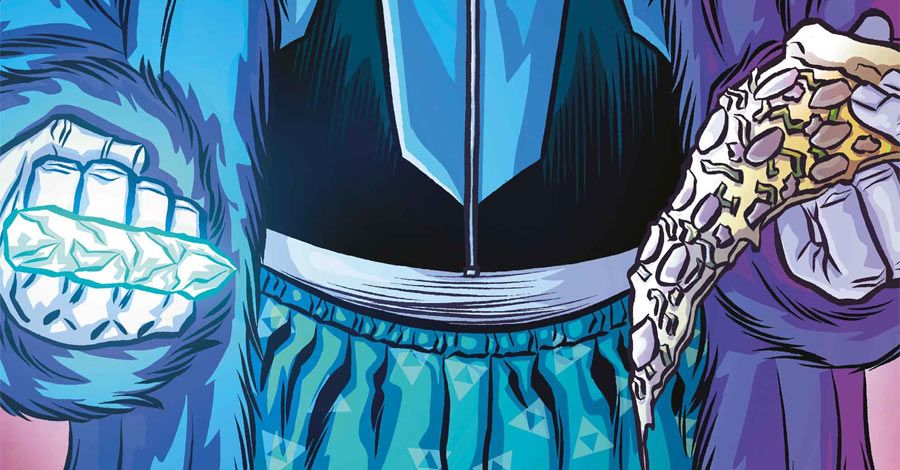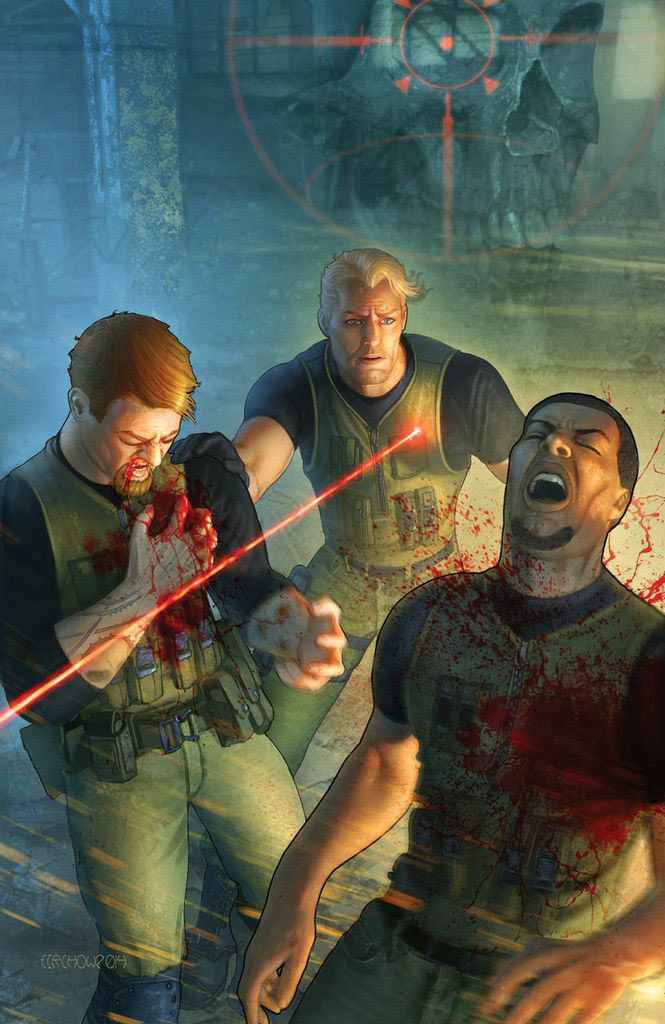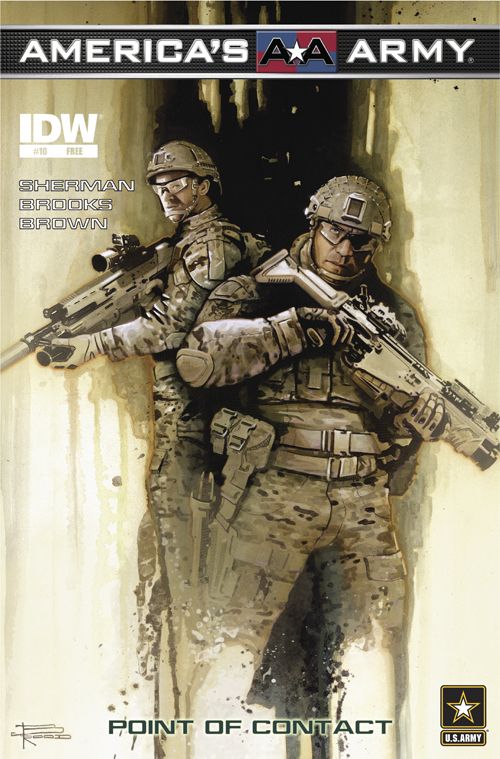Dirk Wood, VP of Marketing for IDW Publishing, thanked everyone for coming to the publisher's "Pop Culture Mix Tape" Comic-Con International panel. "Is everyone old enough to remember what a mix tape is?" Wood wondered aloud, explaining that IDW puts out a ton of books, and they do a lot of them with partners who produce the creative work and then rely on IDW to publish it, such as Yoe Books, Library of American Comics, Monkeybrain and Darby Pop. At this point, he also introduced the hour's panelists: Chris Mowry, writer of "Godzilla: Rulers of Earth," David Steward, Founder and CEO of Lion Forge Comics, M. Zachary Sherman, writer of "America's Army" comics, Brian Winkeler, writer of "Knuckleheads," Robert Wilson IV, artist of "Knuckleheads," Stephen Scaia, writer of "Dead Squad," Matt Federman, writer of "Dead Squad," Scott Marder, writer of "Doberman," and Vernon Whitlock and Matt Krentz, writers of "Blaze Brothers"
Wood noted that Lion Forge has been doing very well digitally, so IDW wanted to team with them to print their work. Steward backed this up, saying that the partnership with IDW allows Lion Forge to focus on creative stuff while IDW takes care of the marketing and publishing. IDW has a lot of different innovative ways of looking at the print market, so it was an ideal situation for them. Lion Forge has landed the rights to many licensed properties in their short existence, such as "Knight Rider," "Airwolf," "Miami Vice," "Saved by the Bell," "Punky Brewster," "Care Bears," and "Nighthawks," which got a nice reaction from the crowd. For "Airwolf," they were allowed to change the helicopter a bit to make it more "bad-ass." In "Knight Rider," Michael Knight uses his fists less and guns more -- he's more of a "James Bond, John Woo kind of character." "Miami Vice" -- they didn't update it, because it's "Miami Eighties personified." The book takes place between Seasons 1 and 2 and explains some things that happened on the television show, like why Crockett's boat changed. Steward mentioned a new title, "Night Trap," which is written by Cullen Bunn and pays tribute to 1980s horror movies. When Steward noted that they were doing "Punky Brewster," Wood joked that it was his lifelong goal to publish a "Punky Brewster" comic. Wish granted! Lion Forge is also publishing "Rampage Jackson: Street Soldier," in which the UFC fighter gets superpowers.
Next, Winkeler and Wilson talked about "Knuckleheads," which they publish digitally through Monkeybrain, a comic about a guy who gets superpowers from aliens. The twist is that the aliens were supposed to give the powers to the guy's roommate, who was much more worthy of them. Trev, the guy who gets the powers, is a big slob -- he uses his powers for his own gain until he needs to save the city from a monster. With vomit and irritable bowel syndrome thrown in, creators joked that the series is "highbrow." Winkeler mentioned that the comics' eight issue run tell a complete story, but there's always room for more arcs.
Sherman writes "America's Army" comics, which are free on comiXology. The main character is a general in a fictitious country, and Sherman said he's "convinced" Vladimir Putin reads the comic, because some of the things that are going on in the Crimea already occurred in the comic. "Thanks for planning that," Wood joked. Shermen said he has fun with his artist, Scott Brooks, by telling him to draw a hundred soldiers on a page and then letting him get to it. Sherman also consults with the armed forces, especially the Army, as he attempts to make the comic very realistic. In some of his scripts, he actually gave away some classified military information, which he wasn't supposed to include. Wood noted the long history of comics and the military, and Sherman said soldiers have read his work and given positive feedback.
Marder was up next, discussing "Doberman," which is published by Darby Pop. "It's sort of like Anchorman meets every great Eighties action movie star, like Segal or Stallone or Schwarzenegger." The comic stars an '80s supercop who goes into exile for years and when he returns, he tries to "kick ass" the way he's used to, but finds that attitudes toward police work have changed, all while he's trying to solve a mystery. Marder described it as an homage to the '80s cop movies he watched growing up. The movies took themselves so seriously, so he decided to put a humorous spin on them. Wood encouraged people to check it out at the IDW booth -- he started to tell people to flip through it, but then amended himself, channeled his marketing knowledge and said, "Buy it, then flip through it!"
Scaia and Federman talked about "Dead Squad," in which a Delta Force squad is killed and brought back to life thanks to "next-generation medical technology." They have an existential crisis because they know what happens to people when they die, and they don't know if they want to keep killing the bad guys. Federman said while they were doing research for a show, a Special Forces guy waterboarded him so he could write about the experience. He didn't really want to do it, but the Special Forces soldier was the kind of guy that you didn't say "no" to, so when he offered, Federman said, "Yes, sir." After the experience, the Special Forces guy went into a monologue wondering if the people he'd killed deserved to die, so the comics creators decided to combine the science fiction angle with the more existential angle. The "Dead Squad" has only 30 hours before the technology keeping them alive wears out and they need to find an upgrade if they want to keep living. Wood believes existential crises play well in comics because of narrative captions, and Scaia agreed, but noted that the book is also awesome -- "We don't want to be the first comic on this panel that is not bad-ass," he joked.
Whitlock and Krentz went next, saying if "Pulp Fiction" were a comic, it would be their "Blaze Brothers" series. It's a story -- "A true story!" Krentz joked -- about orphaned half-brothers raised by a Chinese martial arts expert who wind up as debt collectors for a Japanese drug lord. The drug lord thinks they stole something from him, so he sends every assassin he can find after them. According to the writers, it's very violent, but it's also about the brothers trying to find a way out of the violent life they live. Wood said, "it sounds very existential as well." Whitlock said they wanted it to be very dark and textured, which the book's artist, Marat Michaels, provided.
Andy Schmidt joined the panel to discuss his website, Comics Experiences, which teaches classes on how to make comics, including many taught by comic professionals, with Chuck Dixon and Reilly Brown among the instructors. They reached out to IDW to publish comics by their students, and Schmidt went over some of them. He talked about "Creature Cops: Special Varmint Unit" by Rob Anderson and Fernando Melek. It's a comic about a world in which hybrid human/animals are running around, and someone needs to round up the bad ones. "Drones," by Chris Lewis and Bruno Oliveira, is about drone pilots who go to Vegas and find a terrorist-themed hotel. Schmidt said it's part social commentary and part ultra-violent thriller. Schmidt said it operates on a lot of levels -- he laughs at the book, but he's horrified sometimes, and always "bedazzled." "Gutter Magic" is about a world where World War II was fought with magic, and in the present, wizards have become the new "1%." The heir to a powerful family that's fallen on hard times is now fighting against the powers-that-be. It's by Rich Douek and Brett Barkley. Finally, "Tet," by Paul Allor and Paul Tucker, is a book about the days leading up to the Tet Offensive. It's both a love story and a war story. It gets dark, as the creators did a lot of research on Vietnam to make it as realistic as possible. These books will begin coming out in January
Wood noted that Godzilla is a licensed character, so it doesn't exactly fit in with the rest, but Mowry approaches it like a creator-owned comic. IDW had to prove to Toho, the owner of Godzilla, that they could take care of the property. Mowry mentioned that you can tell a lot of different stories with Godzilla -- "Rulers of Earth" is monsters doing monster things, but he upon seeing John Layman enter the hall, he noted that Layman's "Gangsters and Goliaths" was a different take on the character. Wood pointed out that Mowry has made a grass-roots effort to promote the book from the very beginning of IDW having the license, and now "Godzilla: Rulers of Earth" is IDW's longest-running Godzilla title, even though it wasn't supposed to be -- they planned it for only 8 issues, but it was so popular they had to rework the ending. Now, they're pretty confident it can reach issue #25, which would make it the longest-running Godzilla comic in history.



